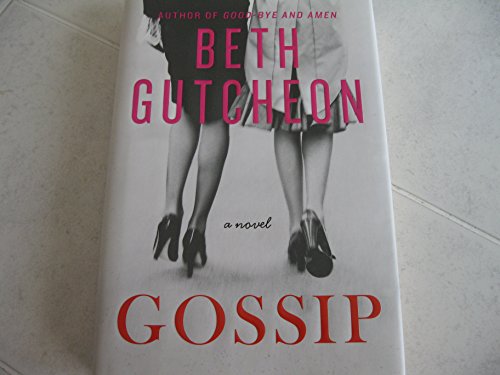Gossip: A Novel

“One day we shall have a new face on the Mount Rushmore of women’s fiction, a great stone face staring blankly out along side Susann, Collins, and the late, lamented Dominique Dunne. But not today. Today we have only Gossip—and even it has been redefined and dumbed down for our threadbare modern age.”
Gossip is the sort of novel in which once we have met our main characters we are immediately transported back a quarter century to a girl’s boarding school, where we see them young, fresh, and without makeup. (Think: The Group.)
It is the sort of novel in which, for better or worse, the relationships formed at just such an exclusive school last a lifetime. (Think: The First Wives Club.) And it is the sort of book in which mean girls grow up to be smug adults, and nice girls, who seemed kind of slow in their youth, grow up to be very, very wise. (Think: The Starter Wife or anything by Jackie Collins.)
And finally, it is the sort of book in which the wealthy, powerful, and talented are beset with problems stemming from drink, sex, fame (or the lack thereof), dearth of good help, and overwhelming family ties. (Think, the grand dame of them all, Jacqueline Susann, and wistfully remember how juicy this sort of book could be.)
From these comparisons, we can conclude a few things:
That Gossip is a sort of throwback, despite its references to events like 9/11. It seems the product of simpler times, when family secrets were held tight within the inner circle, and not the stuff of Internet sites and tell-all memoirs. Of a time in which having an alcoholic in the attic or a married lover in the Hamptons was still something only whispered about over lunch at Daniel or Le Cirque.
That Gossip, despite its references to the economic turndown and the popping of the mortgage bubble, reads as a sort of tired retread of what has come before, leaving the reader the question the need for a book like this at this time.
And that the one thing that Gossip needs a good deal more of is, well, gossip. . . .
With a setting in the environs of what we are told is the small, ultra exclusive village known as the Upper East Side in Manhattan, and with a cast of characters who have, one way or another, found a place in that village that very likely comes with a view of Central Park, and with a title that rather blatantly suggests that tongues are a-waggin’ it seems strange that, throughout the whole of the story, very little depends upon the telling of tales out of (boarding) school. Sure slick, glib gossip-columnist-turned-cooking-teacher-to-the-rich Dinah Wainwright fails to get into the social club of her dreams because of some nasty rumors, but little comes of it, save bewilderment on Dinah’s part.
Instead, we are given the interconnected lives of three women, smart Dinah, dull Avis Metcalf and the ridiculously named Loviah Walker, the loyal one—who is, unfortunately, known to her friends by a name that should have stayed lost on “Gilligan’s Island,” “Lovie.”
In tracking the interconnected lives of these three, we explore American life from the seventies forward, as each learns to cope with career, marriage, motherhood, working motherhood, divorce, child rearing when good help is hard to find, the difficulty of finding a good summer rental on Nantucket, and the sorrows of society affairs, when your rich lover dies and fails to leave you the weekend house in Connecticut.
Oh, where are the society balls—at which, as Dominick Dunne once shared with us, the thousands of butterflies who are meant to beautifully descend, leaving the guests in a state of awe instead are killed by the electric lights, leading to a major social gaffe? Where are the catfights, the fake breasts, and the miscarriages that readers have come to expect from such fiction?
In Gossip, we are given reason to hope, right up front, that this might be the sort of book that could hold its place next to People Like Us. When Dinah gets her gossip column, things look so very bright, even if the column is the horribly named “Dinah Might.” But this sadly leads our leaden narrator (“Lovie”) to ponder the nature, function, and purpose of gossip:
“Did you know that the origin of the word gossip in English is ‘god-sibling’? It’s the talk between people who are godparents to the same child, people who have a legitimate loving interest in the person they are talking about. It’s talk that weaves a net of support and connection beneath the people you want to protect.”
Huh?
Not sure where Lovie got that definition. My dictionary defines gossip as: “casual or unconstrained conversation or reports about other people, typically involving details that are not confirmed as being true: he became the subject of much local gossip.”
And so reader and writer reach a parting of the ways.
Throughout the book, the teasing continues. Like here:
“When she was retuned to me, Belinda’s lashes were wet with tears. She looked at me with a face for once empty of cheer and said in a tiny voice, ‘You can’t imagine the indignities.’ It was true, I couldn’t. Though I was learning to fear them deeply in the small hours of the night. The next moment she pulled herself together like one gathering up a failed house of cards, and said, ‘Now tell me the gossip.’”
Oh, if only someone would. . . .
One day we shall have a new face on the Mount Rushmore of women’s fiction, a great stone face staring blankly out along side Susann, Collins, and the late, lamented Dominique Dunne. But not today. Today we have only Gossip—and even it has been redefined and dumbed down for our threadbare modern age.